G'day Gdansk
(Marie-Mail entry #39)
GDANSK, POLAND
JUNE 9
I awoke, cramped and exhausted in my bus seat, to the sounds of giggling teenagers. I glared at them. Maybe they'd get the point and shut up. But then I realized that all the other adults were glaring too, and had been at it for a lot longer than I had. It was hopeless.
Finally, I resigned myself to waking up in spite of the early morning hour. I stared at the Polish fields for a while and watched the sun rise over a distant farm.
Poland is big by European standards. It's the size of New Mexico, and we'd been driving across the north-east part of it since midnight. The bus itself was decrepit, with lopsided seats and a rickety body. The driver had been at it for ten hours, with only a short break at the border. Around nine, I closed my eyes and managed a brief, fitful rest.
A "thud" at the front of the bus woke me up. We'd hit something small; perhaps, I thought, a dog or small object.
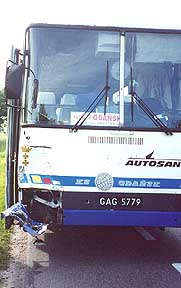 the bus creamed a little red car
the bus creamed a little red car
The driver pulled out his cell phone and made a call. Several passengers jumped out of their seats and went to look. Everyone else stared at each other. What was going on?
An ambulance and fire truck showed up within minutes. It dawned on me that ambulances don't come for dogs. I got off to see what was going on.
The bus had creamed a tiny red car. It was the size of a Yugo, of the old Renault LeCar. It was more of a lawnmower than a car. The back of it was completely crushed but the driver and passenger seats were structurally intact.
My fellow bus-riders had taken the passenger -- a young, blond girl of perhaps twelve years old -- aside. Someone had sensibly covered her with a sleeping bag to prevent shock. The girl looked physically fine, but was obviously distraught.
The driver was bundled up in a stretcher and whisked away. The windshield was not cracked or broken, there was no blood, and Poland has stringent seatbelt laws. I guessed that although the accident was serious, most of the damage was done to the car and not to the people.
A second bus arrived to take us to Gdansk. We passengers boarded, along with a Polish policeman. He asked for Polish-language speakers to discuss the accident, and got a few volunteers. Most of the passengers spoke Lithuanian and Russian, and very few had been watching the front anyway.
It was less than an hour to Gdansk, and the passengers disappeared quickly into the surrounding bus station. I got my bag and walked down the stairs to the pedestrian railway under the railway station.
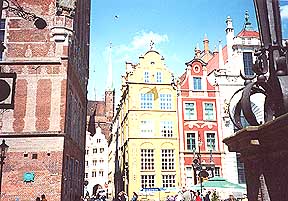 Gdansk
Gdansk
After getting some zloty currency out of an ATM, I bought a bus ticket at a kiosk. The system had been the same since Tallinn -- you buy tickets at convenience stores, and validate them in a machine on the bus. It's an honesty system, encouraged by surprise checks and on-the-spot fines.
I'd reserved a room via the internet, as one of my least-favorite aspects of traveling is wandering around (with a heavy bag) to booked-up hotels. Gdansk is lacking in centrally-located budget accommodation, so I'd chosen a guesthouse two kilometers from the center. The bus instructions seemed clear, but I was nervous. Still, if I could get from New York to Poland on public transport, surely I could get around Gdansk with no problem.
It was easy. Within minutes, I found myself at Mac-Tur, a guesthouse that "In Your Pocket" described as "comfortable" and "helpful."
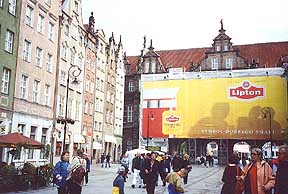 the old city of Gdansk, sponsored by Lipton
the old city of Gdansk, sponsored by Lipton
Mac-Tur was more than that. It was brand new and inexpensive. Maria Macur, the owner, had just finished adding twenty new rooms, all decked out in blond wooden furniture. She even had en suite rooms, but I was too lazy to carry my backpack up the additional two flights of stairs, so I paid for a room with a shared bathroom on the second floor.
I hurried back to the historic quarter, anxious to see the restored medieval center.
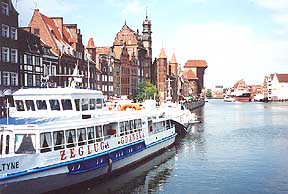 Gdansk port
Gdansk port
Gdansk, a major Baltic port and shipbuilding center, was completely devastated during World War II. Hitler had started his conquest of Europe here, and during later offensives, the Red Army destroyed what was left. But to their credit, the Soviets had rebuilt the town from scratch, precisely matching the old Teutonic and Gothic styles.
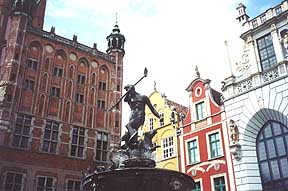 Neptune adorns the center of the old city
Neptune adorns the center of the old city
The end result of the rebuilding was that Gdansk was another in a line of quaint, atmospheric medieval towns. The problem was that I didn't care. I was numb to the effects of quaintness by now, cognizant of its appeal but unable to appreciate it. I walked the picturesque streets, admired the waterfront, and snapped photos of the old city gates. Amber souvenirs abounded as they had throughout the Baltic region, but I couldn't work up any interest.
JUNE 10
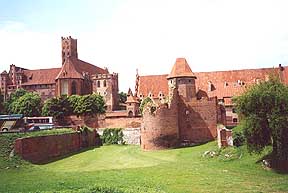 Marlbork, a huge Teutonic castle
Marlbork, a huge Teutonic castle
I caught the train to Marlbork, to see its 14th-century Teutonic castle. I had no map, and worried that I wouldn't be able to find my way from the train station. As it turned out, I had only to follow the crowds.
Marlbork Castle is huge and the guidebook suggested I "leave a few hours to get lost in its dark, cavernous chambers." I promptly got lost, as suggested, in spite of the crowds and orienting sounds of the high school orchestra playing in the courtyard.
"Wonder where that staircase goes," I thought, just before finding out that the guidebook did not lie.
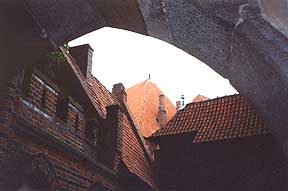 Marlbork Castle
Marlbork Castle
The castle itself had been made safe for mass tourism, so the floors and staircases were smooth. Nothing was out of place. I definitely preferred dilapidated ruins to immaculate reconstructions but was nonetheless impressed by the sheer size of the estate, which even featured a drawbridge and an unfilled moat.
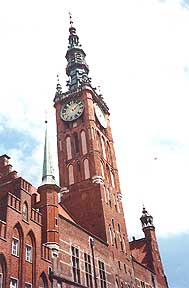 Gdansk
Gdansk
I walked back to town, ate some pierogies, and caught an express train back to Gdansk. After dropping by Mac-Tur to get my bag, I caught the bus back to the train station.
At the last bus stop, men with badges boarded. They checked everyone's bus tickets. I showed mine silently. They nodded and moved on. I was relieved -- until then, I'd had no idea if I was validating my ticket correctly.
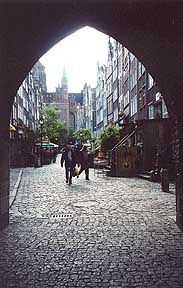 old city
old city
I caught a sleeper train to Berlin. I would have been excited if I could remember how. In the morning, I'd get the keys to my new apartment, and I'd stay still for a month.
NEXT: A good, long sleep. Lactose-free milk, home-cooking, and breakfast with the BBC.